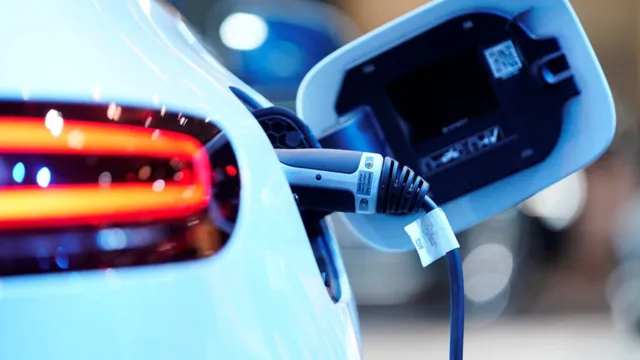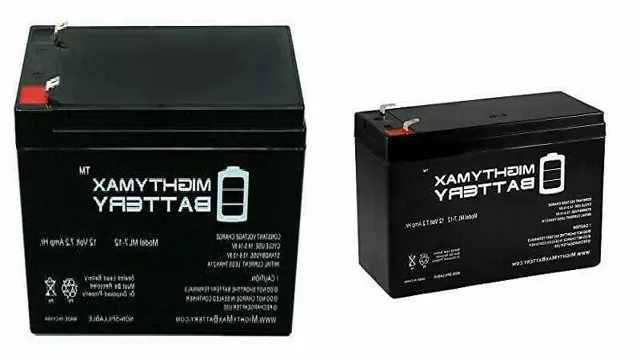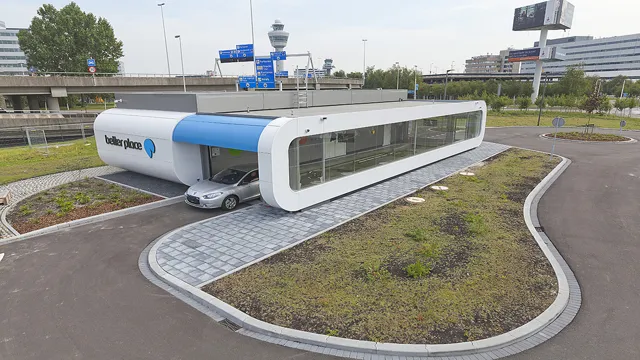Revolutionizing the Roads: The Future of Electric Car Batteries
The world is changing, and so are our modes of transportation. The electric vehicle (EV) industry is gaining momentum, and there are no signs of it slowing down. One of the crucial factors behind the successful adoption of electric cars is the evolution of battery technology.
Battery technology has come a long way, and it is still rapidly improving, making electric cars more efficient and practical for everyday use. In this blog post, we will explore the future of electric car batteries, what we can expect in the upcoming years, and how it could change the landscape of the automobile industry. So, fasten your seat belts, and let’s dive into the world of electric car battery technology!
Current State of Electric Car Batteries
It’s an exciting time for electric car batteries as the future looks bright with new advances in technology. Battery electric vehicles are becoming more popular and affordable, especially with large scale production from major car manufacturers. Tesla has been leading the way, but other companies are following closely behind.
One major development is the solid-state battery, which promises higher energy densities and faster charge times. This type of battery relies on solid electrolytes rather than liquid, making them safer and potentially longer-lasting. However, they still face technical challenges before being ready for mass production.
Another promising technology is using silicon for the negative electrode in lithium-ion batteries, which could greatly increase their energy capacity. As research continues, we can expect to see even more improvements and innovations in electric car batteries, leading to a cleaner, more sustainable future.
Growing Popularity of Electric Cars and the Need for Better Batteries
The rising popularity of electric cars has been one of the most significant technological advancements in the automobile industry. However, the efficiency of these cars is heavily reliant on the state of their batteries. So far, lithium-ion batteries have been the primary power source for electric cars, but they have their limitations.
Despite being an improvement over early models, lithium-ion batteries have not yet reached their full potential. They have issues with limited range, long charging times, and degradation over time, all of which are hindering the growth of electric vehicle adoption. As a result, there is a growing need for better batteries that can improve energy density and vehicle range while reducing charging times and costs.
It is a crucial time in the electric vehicle industry, and next-generation electric cars will require better, more efficient batteries to drive the revolution forward.

Types of Battery Technologies Used in Electric Cars Today
As electric cars continue to gain popularity, the types of battery technologies used in these vehicles continue to evolve and improve. Currently, there are several different types of batteries used in electric cars, including lithium-ion batteries, nickel-metal hydride batteries, and solid-state batteries. Lithium-ion batteries, in particular, are the most commonly used battery type due to their high energy density and long lifespan.
However, solid-state batteries are beginning to emerge as a promising alternative, offering even higher energy densities and the potential for faster charging times. Despite these technological advancements, the current state of electric car batteries still presents some challenges, such as limited range and high costs. However, as battery technology continues to advance, it is likely that these issues will be overcome, allowing electric vehicles to become a more viable and accessible form of transportation.
The Future of Electric Car Batteries
The future of electric car batteries looks promising, with constant advancements being made in battery technology. One of the major goals being pursued is to improve the energy density of batteries, allowing them to store more energy in a smaller size. This will increase the range of electric vehicles and make them more competitive with traditional gasoline vehicles.
Another focus is on reducing the cost of batteries, which will make electric cars more affordable for the masses. Nanotechnology is also being explored to develop batteries that can charge faster and last longer. While there is still room for improvement, the future of electric car batteries is looking bright and could potentially revolutionize the way we travel.
Advancements in Battery Technology and What They Mean for Electric Cars
Electric car batteries have come a long way since the first commercially available electric vehicles hit the market. Advances in battery technology mean that electric cars now offer greater range and faster charging times than ever before. Lithium-ion batteries have become the industry standard for electric vehicles, but companies are investing heavily in new battery chemistries such as solid-state and lithium-sulfur batteries.
These could offer even better performance than the lithium-ion batteries currently in use, potentially increasing range and reducing charging times. Improvements in battery management systems are also making electric cars more efficient, while wireless charging technology could eliminate the need for manual charging entirely. As these advancements continue, electric cars could soon be just as convenient and versatile as their gas-powered counterparts.
New Battery Materials and Breakthroughs in Energy Density
As we continue to see advancements in battery technology, the future of electric car batteries is looking brighter than ever. From new materials like lithium-sulfur and solid-state electrolytes to breakthroughs in energy density, these batteries are becoming smaller, lighter, and more efficient. One of the key materials being developed is solid-state electrolytes, which offer a significant increase in energy density compared to traditional liquid electrolytes.
Additionally, researchers are looking to replace conventional lithium-ion batteries with lithium-sulfur batteries, which have the potential to store up to five times more energy. As we move towards more sustainable modes of transportation, these new battery materials and breakthroughs in energy density will play a crucial role in making electric cars a practical and viable option for the masses. So, buckle up and get ready for some exciting developments in the world of electric car batteries.
Charging Infrastructure and Its Role in the Success of Electric Cars
The future of electric car batteries is exciting, as advancements in technology are constantly being made to improve their performance. With electric cars becoming increasingly popular, the need for efficient and long-lasting batteries is becoming more important than ever. One development is solid-state batteries, which have the potential to greatly improve the range and safety of electric cars.
Solid-state batteries use solid electrolytes instead of liquid ones, which are known to leak and cause fires. They also have higher energy densities, meaning they can store more energy in a smaller space. With this technology, electric cars could feasibly have a range of up to 500 miles on a single charge.
Additionally, there are also advancements being made in wireless charging, making it more convenient and accessible for electric car owners. As charging infrastructure continues to improve, the future of electric cars and their batteries looks bright.
Environmental Impact and Sustainability of Electric Car Batteries
As electric cars become more popular and mainstream, the future of electric car batteries is a hot topic. One major consideration is the environmental impact of battery production and disposal. While electric car batteries produce no emissions during driving, the production process requires a significant amount of energy and can result in the creation of pollutants.
Additionally, the disposal of used batteries can be harmful to the environment. However, the good news is that electric car manufacturers are taking steps to improve the sustainability of their batteries. Many are using recycled materials in the production process, reducing the amount of waste and pollution created.
Furthermore, innovations in battery technology are making them more efficient and longer-lasting, which means fewer batteries will need to be produced and disposed of in the long run. Overall, the future of electric car batteries looks promising, with manufacturers focused on minimizing their environmental impact and improving sustainability. As more people make the switch to electric cars, it’s important to continue to prioritize the development of sustainable batteries so we can enjoy the benefits of environmentally-friendly transportation without causing harm to the planet.
The Life Cycle of Electric Car Batteries and Their Environmental Footprint
Electric car batteries have become increasingly popular in recent years, but with their rise in popularity comes concerns about their environmental impact and sustainability. The production of electric car batteries involves mining and processing raw materials, such as lithium, cobalt, and nickel, which can have harmful effects on the environment and local communities. Additionally, the disposal and recycling of used batteries can also pose environmental risks if not properly managed.
However, studies have shown that the overall environmental footprint of electric car batteries is still significantly lower than that of traditional gasoline-powered vehicles, thanks to their increased energy efficiency and lower emissions. Developing more sustainable and environmentally friendly methods for producing and disposing of electric car batteries is crucial in ensuring their continued use as a cleaner alternative to traditional vehicles.
Efforts to Create Sustainable and Ethical Practices for Battery Production and Recycling
As more consumers shift their attention towards electric cars, it’s important to consider the environmental impact and sustainability of the batteries used in these vehicles. Fortunately, there are ongoing efforts to create sustainable and ethical practices for battery production and recycling. For instance, manufacturers are working towards reducing the use of harmful materials such as cobalt, nickel, and lithium in battery production, and are exploring alternative options such as solid-state batteries that are more environmentally friendly.
Additionally, there are initiatives to improve the recycling of used batteries, such as using innovative technologies to recover valuable materials and reducing waste. These efforts not only reduce the impact of electric car batteries on the environment but also ensure a more sustainable future for the industry and the planet as a whole.
Conclusion: The Promising Future of Electric Car Batteries
The future of electric car batteries is indeed bright, and we are charged up about it! With rapid advancements in technology, we can expect to see longer range, shorter charging times, and more sustainable materials used for batteries. And who knows? Maybe even self-charging or wireless charging capabilities aren’t too far away. So get ready to hit the road with power and ease, knowing that the electric car battery revolution is here to stay!”
FAQs
What is the current state of electric car battery technology?
Electric car battery technology has come a long way over the past decade, with significant advances in terms of range, charging time, and performance. However, there is still much research and development needed to make electric cars more competitive with traditional gasoline-powered vehicles.
What are some of the key challenges facing the future of electric car batteries?
Some of the key challenges facing the future of electric car batteries include the need for increased energy density, faster charging times, and reduced costs. Additionally, there is a need to develop more sustainable and environmentally-friendly battery materials.
How long do electric car batteries typically last?
The lifespan of an electric car battery can vary significantly depending on a range of factors including usage patterns, driving conditions, and the quality of the battery itself. Generally speaking, most electric car batteries are designed to last for at least 100,000 miles or more.
What advancements can we expect to see in electric car battery technology in the coming years?
In the coming years, we can expect to see significant advancements in electric car battery technology, including increased energy density, faster charging times, and longer battery lifespan. Additionally, there is a strong focus on developing more sustainable and environmentally-friendly battery materials, such as solid-state batteries.





